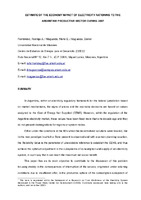| dc.creator | Fernández, Roberto Antonio | |
| dc.creator | Muguerza, María Eva | |
| dc.creator | Muguerza, Daniel | |
| dc.date.accessioned | 2023-07-27T22:28:40Z | |
| dc.date.available | 2023-07-27T22:28:40Z | |
| dc.date.issued | 2021-11-17 | |
| dc.identifier.citation | Fernández, R. A., Muguerza, M. E. y Muguerza, D. (2021). Estimate of the economy impact of electricity rationing to the argentine productive sector during 2007. Visión de Futuro, Revista Científica. Posadas (Misiones): UNaM. FCE. APLICACIÓN; 9(1), 17 p. | es_AR |
| dc.identifier.issn | 1668 – 8708 (Versión en línea) | |
| dc.identifier.other | VF-434 | |
| dc.identifier.uri | https://hdl.handle.net/20.500.12219/4864 | |
| dc.description | Fil: Fernández, Roberto Antonio. Universidad Nacional de Misiones; Argentina. | es_AR |
| dc.description | Fil: Muguerza, María Eva. Universidad Nacional de Misiones; Argentina. | |
| dc.description | Fil: Muguerza, Daniel. Universidad Nacional de Misiones; Argentina. | |
| dc.description.abstract | In Argentina, within an electricity regulatory framework for the federal jurisdiction based on market mechanisms, the signs of prices and the economy decisions are based on values assigned to the Cost of Energy Not Supplied (CENS). However, within the regulation of the Argentine electricity market, these values have been fixed more than one decade ago and they do not present disintegrations for regions or system nodes.
Either under the conditions in the 90's when the decentralized solutions were favored, like in the new paradigm in which a State present is observed and with a certain planning vocation, the Reliability Value is the parameter of unavoidable reference to establish the CENS, and thus achieve the optimum adjustment in the subsystems of consumption and supply of an electricity
system, in such way that it can reach the maximum net social benefit.
This paper has as its main objective to contribute to the discussion of this problem focusing mainly in the consequences of interruption of the service, originated under rationing conditions due to insufficient offer, in the productive sphere of the consumption subsystem of Argentina. For that the Input- Argentine Product (MIPAr-97) matrix technique is used, that offers an estimate of the CENS value, related to the external effects of the lack of supply in the productive sector of the economy. In particular the effects associated to the rationing, implemented by the Argentine government during 2007, have been quantified.
In the structure of the paper the following main parts can be identified: introduction of the problem, main outlines for the use of techniques of input product, results of their application, conclusion with comment on the consequences and implications for the Argentine electricity sector. | es_AR |
| dc.format | application/pdf | |
| dc.format.extent | 161 KB | |
| dc.language.iso | eng | es_AR |
| dc.publisher | Universidad Nacional de Misiones. Facultad de Ciencias Económicas. Programa de Posgrado en Administración | es_AR |
| dc.relation | info:eu-repo/semantics/altIdentifier/urn/https://visiondefuturo.fce.unam.edu.ar/index.php/visiondefuturo/article/view/642/556 | |
| dc.rights | info:eu-repo/semantics/openAccess | |
| dc.subject | Energy not supplied | en |
| dc.subject | Input-product matrix | en |
| dc.subject | Reliability value | en |
| dc.subject | Rationing | en |
| dc.subject | Argentine electricity market | en |
| dc.title | Estimate of the economy impact of electricity rationing to the argentine productive sector during 2007 | en |
| dc.type | info:eu-repo/semantics/article | |
| dc.type | info:ar-repo/semantics/artículo | |
| dc.type | info:eu-repo/semantics/publishedVersion | |



